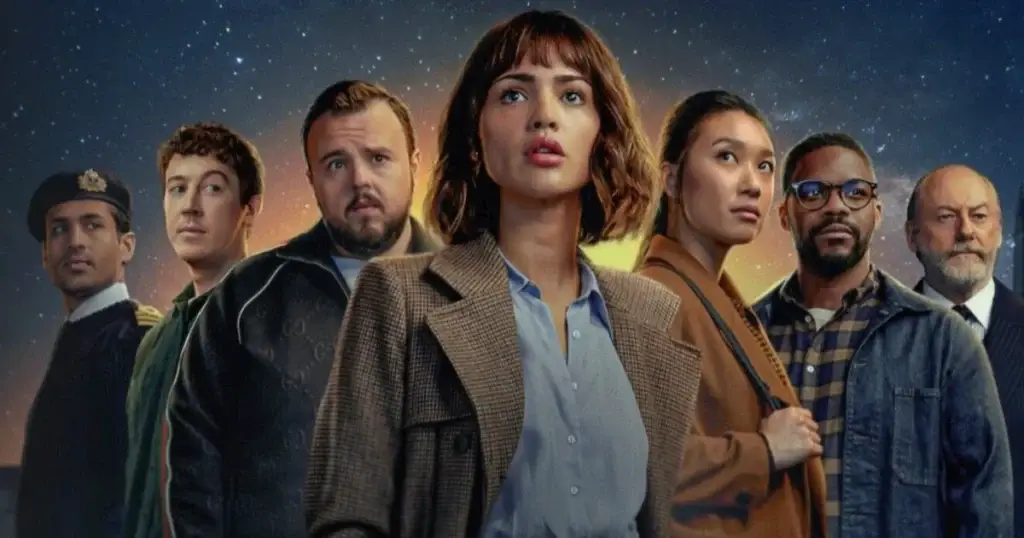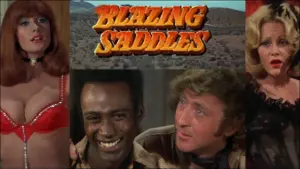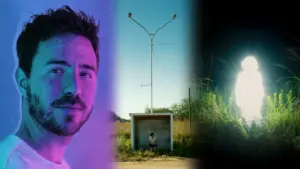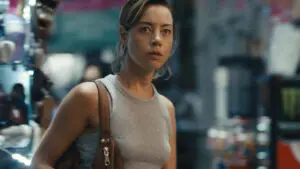In astrophysics, is nearly impossible to predict the movements of three bodies orbiting each other. Over at Netflix, it is equally difficult to predict the quality of their science fiction shows. Many of Netflix’s big series have shot for the stars only to veer of course into the void of failure. Apple TV has been dominating the sci-fi genre with their big, intellectual outings such as Foundation, Silo, and For All Mankind.
The Three Body Problem from author Liu Cixin along with the other two books in its series The Dark Forest and Death’s End are towering masterpieces of science fiction. I read them a few years ago and was captivated with their prolific detail and decidedly Chinese worldview. These books tackle an intricate web of big issues including identity, politics, science, history, interstellar travel, morality, and multiple dimensional space. They are not easy books to read. However, readers are rewarded with a refreshingly creative take on the alien invasion genre. When Netflix announced their intention to adapt the books into a series, I was skeptical. Like Dune, Foundation, and other big epic sci fi series, successfully adapting Three Body Problem to a mass-audience would be as difficult as plotting the orbit of three bodies.
Enter Game of Thrones showrunners David Benioff and D.B. Weiss. These two have a solid resume when it comes to adapting big, sprawling, complex stories. They also have a track record of focusing on superficial shock value at the expense of storytelling. I may be in the minority, but I think Game of Thrones is a convoluted, contrived, and gratuitous mess. I barely made it through the first season before throwing it aside. To help with this difficult job, Weiss and Benioff added a third body to their orbit, True Blood and Terror writer Alexander Woo.
I am happy to report that Netflix’s Three Body Problem is an engaging, enjoyable, and competent adaptation of Cixin’s work. It hits most of the big plot points from the first and third book and effectively captures the size and scope of the series. Whew.
To make the series work, the showrunners significantly re-engineered Cixin’s source material. While some of the original Chinese characters are retained, most are converted or combined into new, English versions. They also centered the series around a newly created group of super smart friends. Furthermore, most of Cixin’s messages are cast aside or simplified. For example, the complex explanations of building 11-dimensional computers are shown, but quickly and with minimal detail.
One item that did make it into the series is the story’s setup. The series, like the book, starts in 1970s China during Mao Zedong’s Cultural Revolution. A young scientist Ye Wenjie (Zine Tseng) watches as zealous revolutionaries beat her dad to death for not going along with the anti-intellectual communist orthodoxy. Wenjie’s is then exploited to work on a top-secret program searching for aliens. Disillusioned at the oppressive, ignorant people running her country, she ignores warnings from the aliens not to contact them. This opening story is powerful, timely, and controversial. Some Chinese nationals were miffed with Netflix’s choice to retain the opening, while also diminishing other Chinese characters. However, this opening establishes a central theme of the series (as well as the books) about the dangers of being anti-science as well as individuals making choices that could impact everybody.
With the opening story out of the way, Three Body Problem then introduces us to the Super Smart Friends, Joey, Chandler, and… no not those friends, but rather nanotech genius Auggie (Eiza Gonzalez), rich playboy Jack Rooney (John Bradley), grumpy physicist Saul Durand (Jovan Adepo), ultra-serious physicist Jin Cheng (Jess Hong), and sad cancer boy Will Downing (Alex Sharp). These pals sit on a couch drinking and smoking weed and talking about how smart they all are. When Auggie starts seeing a countdown in her eyes, the rest of the Super Friends are quickly swept up into the alien invasion story. Could it get any more convenient?
The Super Friends are unquestionably the weakest part of Three Body Problem. From a storytelling perspective, it makes sense to create characters to represent key aspects of the narrative. Chernobyl did this with the character Ulana casting a brilliant Emily Watson, who looked, acted, and embodied the part of a Soviet scientist. Three Body Problem had the right idea creating a diverse group of friends to tell the complex story. They hired the wrong actors.
The most problematic three bodies in this Super Friends group are Gonzalez, Bradley, and Adepo. None of them have screen presence. They deliver their lines inconsistently and without passion. Bradly’s spoiled English brat antics are tiresome and distracting. Adepo is given little to do but react to everybody around him. However, it is Gonzalez who was egregiously miscast. She is dropped into the lead role as a morally conflicted nanofiber expert. Gonzalez is a capable actor, but this was the wrong role for her. She never seems comfortable, and it shows in her performance. However, Gonzalez has a single scene, late in the series, where she briefly shines. She is helping some impoverished people and speaking in her native Spanish. In this scene, she breaks from her character’s stiffness and her performance feels much more natural.
Hong and Sharp perform better. Sharp gets some touching scenes as he succumbs to cancer. He plays his lovelorn sadness for Hong’s character well. Hong looks perplexed and frustrated through most of the show, but she hits her marks better than the others.
However, not all of the performances in Three Body Problem are problematic. Ultra creepy alien sales representative Tatiana (Marlo Kelley) occupies minimal screen time but delivers an outsized performance. Her character ooked me out. Kelley has a weird energy, weird eyes, a weird mouth, a weird voice, and …is just weird. Every time she is on screen, I felt uneasy. I want to see more of her, even though I am afraid of her.
Then there is gruff, inscrutable boss Thomas Wade (Liam Cunningham). This guy absolutely fucks. Cunningham chews through scenery, plot points, foul words, commands, and actors with the gruff intensity of an Irish hitman who is going to ice your whole family. Every moment Cunningham is on screen is deliciously awesome. Wade’s sidekick Da Shi (the ever-cheery Benedict Wong) is equally fun to watch. Wong plays his usual schlubby Asian guy, but this is a case where the book character was a perfect fit for Wong’s disheveled man of wisdom.
The show is brisk yet sufficiently epic. The first few episodes take their time to establish the players and themes. Once the core conflict is revealed, the latter episodes move quickly. There are some jaw-dropping moments, especially when a super-tanker gets chopped up into French fries. This scene is lifted directly from the book, and it is exceptionally well done (and scary). The scenes set inside an advanced virtual reality game are equally impressive (and also lifted directly from the books). Watching nude human beef jerky come back to life is weirdly arousing.
Three Body Problem shares a lot with Apple TV’s Foundation. They are both sprawling, epic stories with source material that is difficult to adapt. They both had to reinvent material to size the show into the current culture and timeframe. They both succeed in the face of overwhelming odds against them. Netflix may be coming out of hibernation to enjoy a stable era of sci fi shows.
Though it lacks much of the source material’s complexity, Three Body Problem is a well-made and enjoyable adaption. I hope Netflix greenlights another season, as there is a lot more to explore. I also hope the second season maintains the delicate balance between feeling light and nimble while tackling the massive weight of multi-dimensional combat.










